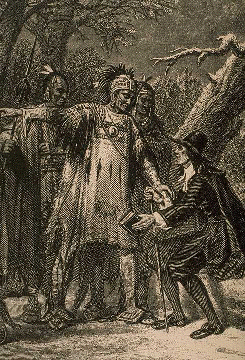|

|
Chapter 1: Early
American Literature to 1700
and Puritanism
Roger Williams
1603?-1683
|
©
Paul P. Reuben
September 12, 2019
E-Mail
|
Page Links: |
Primary
Works |
Selected
Bibliography 1980-Present
| Study
Question |
MLA Style
Citation of this Web Page
|
Site Links: |
Chap
1 - Index |
Alphabetical
List |
Table
Of Contents |
Home
Page
|

Did Roger Williams get
the land for free or did he purchase it?
"The two Narragansett Indian
Sachems that deeded the land for Roger Williams' colony were
Canonicus and Miantonomi. No money (or equivalent) for the Providence
land was exchanged - the land deed for the Providence colony was
essentially a grant from the two Sachems to Roger Williams." (from
Roger
Williams and the Sachems
)
"Relations between the
early settlers and the Indians were friendly, due mostly to the
friendship and respect between Williams and Miantonomi, the chief
sachem of the Narragansetts. Land was purchased from the Indians with
fair negotiations and mutual agreement." (from Indians
and Colonists)
"Roger purchased land from
the Narragansett Chiefs, Canonicus and Miantonomi and named his
settlement Providence in thanks to God. The original deed remains in
the Archives of the City of Providence." (from Roger
Williams Biography)
"Williams had purchased the
land from the aged Canonicus and the younger Miantonomoh, who had
learned to love him." (from Rhode
Island Colonial History)
Primary
Works
A Key into the
Language of America, 1643; Mr. Cotton's Letter Lately
Printed, Examined, and Answered, 1644; Queries of the
Highest Consideration, 1644; The Bloody Tenent of
Persecution for Cause of Conscience, Discussed in a Conference
hetweene Truth and Peace, 1644; Christenings Make Not
Christians, 1645; Experiments of Spiritual Lzfe and Health,
1652; The Fourth Paper Presented hy Malor Butler, 1652;
The Bloody Tenent Yet More Bloudy hy Mr. Cotton's Endeavor to
Wash it White in the Blood of the Lamhe, 1652; The Hireling
Ministry None of Christs, 1652; and George Fox Digg'd Out
of His Burrowes, 1676; The Complete Writings of Roger
Williams, 6 vols., ed. J. Hammond Trumball, 1866&endash;1874,
rpt. with additional vol. by Perry Miller, 1963.
A key into the language
of America. Edited with a critical introd., notes, and commentary
by John J. Teunissen and Evelyn J. Hinz. Detroit: Wayne State UP,
1973. E99 N16 W67
The correspondence of
Roger Williams. Glenn W. LaFantasie, editor. Providence, R.I.:
Brown UP, 1988. F82 .W64
| Top
| Selected Bibliography 1980-Present
Bremer, Francis J. ed.
Puritanism: transatlantic perspectives on a seventeenth century
Anglo-American faith. Boston: Northeastern UP, 1993. BX9322
.P87
Cohen, Matt. The
Networked Wilderness: Communicating in Early New England.
Minneapolis, MN: U of Minnesota P, 2010.
Gaustad, Edwin S. Liberty
of conscience: Roger Williams in America. Grand Rapids, Mich.:
W.B. Eerdmans Pub. Co., 1991. BX6495 .W55 G38
Gordis, Lisa M. Opening
Scripture: Bible Reading and Interpretive Authority in Puritan New
England. Chicago: U of Chicago P, 2003.
Hardman, Keith. Issues in
American Christianity: primary sources with introductions. Grand
Rapids, Mich.: Baker Books, 1993. BR514 .H37
Kaufmann, Michael W.
Institutional Individualism: Conversion, Exile, and Nostalgia in
Puritan New England. Hanover: Wesleyan UP, 1998.
Read, David. New World,
Known World: Shaping Knowledge in Early Anglo-American Writing.
Columbia: U of Missouri P, 2005.
Skaggs, Donald. Roger
Williams' Dream for America. NY: Peter Lang, 1993.
Spurgin, Hugh. Roger
Williams and Puritan radicalism in the English separatist
tradition. Lewiston NY: E. Mellon P, 1989. F82 .W7 S68
Study
Questions
(a) What can we infer about
Williams's intentions from the fact that he chose to compose A
Key into the Language of America as an "implicit dialogue"
rather than as a dictionary?
(b) Characterize the persona
of the first-person narrator in A Key. What kind of person does
Williams present himself as?
(c) How is Williams's book
like a key?
(d) How do the various
sections of each chapter in A Key relate to one another and to the
whole work?
(e) What lessons can a
Christian learn from the Indians?
(f) Why might Williams once
have objected to Europe and the rest of the West being referred to as
"Christendom"?
(g) In what ways was a
colony in the New World like a ship at sea?
(h) What did Williams gain
from his treaty with the Indians besides legal ownership of some
land?
MLA Style
Citation of this Web Page:
Reuben, Paul P.
"Chapter 1: Roger Williams." PAL: Perspectives in American
Literature- A Research and Reference Guide. WWW URL: http://www.paulreuben.website/pal/chap1/williams.html
(provide page date or date of your login).
| Top
|

